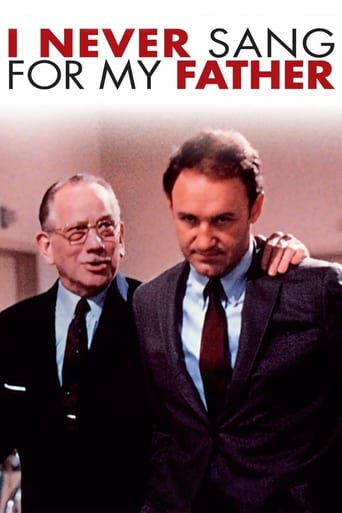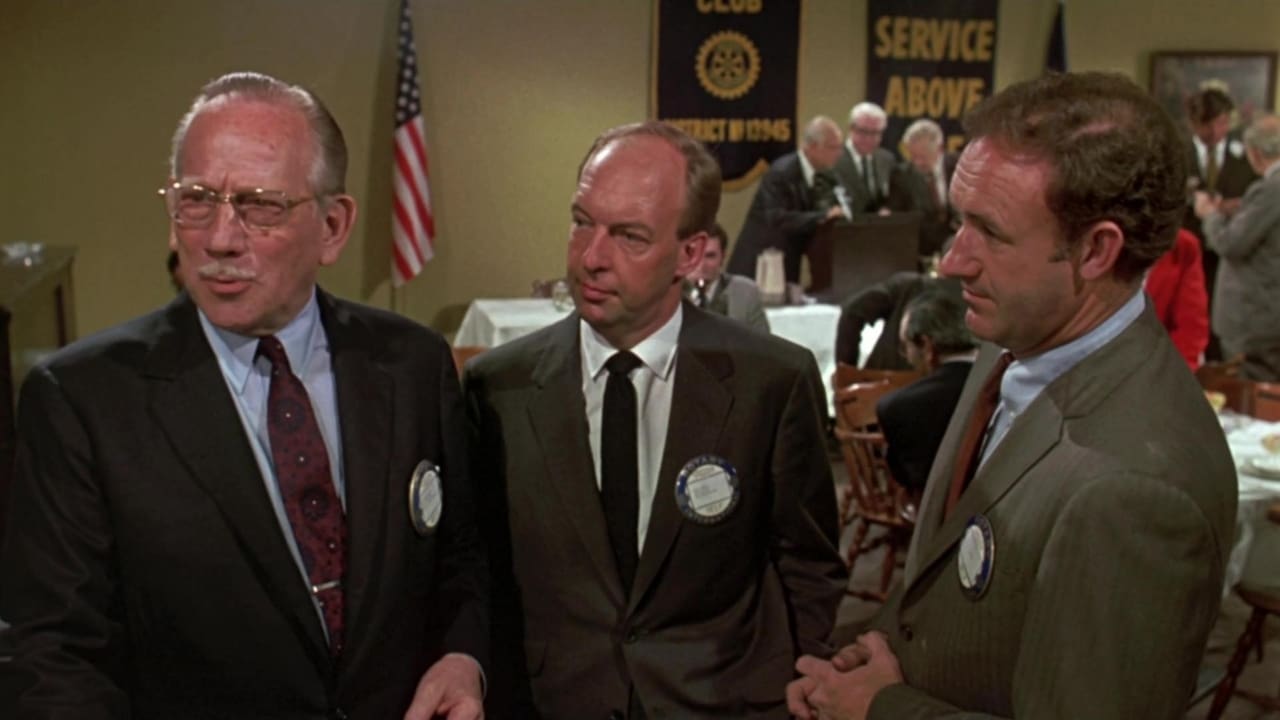bkoganbing
Leading roles for senior citizens are hard to come by so when Melvyn Douglas was
cast in I Never Sang For My Father of course he grabbed it up. Douglas was enjoying a rejuvenated career on the big screen since 1962 when he got a Best
Supporting Actor Oscar for Hud. For the 50s he concentrated on the stage and
the small screen.The picture we get of Douglas is he came from a hardscrabble background with
little place for any kind of charm or social grace. He worked hard his whole life,
but all work and no play leave Jack rather arrogant. His wife Dorothy Stickney
has put up with him, but love has not been returned evenly to say the least.It was difficult growing up for kids Gene Hackman and Estelle Parsons. Hackman is now a widower and Parsons has her own family. Parsons got out
as soon as she could. Hackman who is a university professor never got any
encouragement whatsoever. Douglas is really quite ignorant, he does not know what a jungle academia is and what it takes to survive.Then Stickney dies and Douglas gets more cantankerous than ever. Where will
they put him, who will get stuck with him. A man who prided himself on always doing for himself won't concede that soon enough he will need help
just for day to day living.Robert Anderson's play on Broadway ran 124 performances in 1968 and starred British actor Alan Webb as the father, Lillian Gish as mom, and Hal
Holbrook as the son. Anderson got an Oscar nomination for Best Adapted
Screenplay for his own work.The Garrison family dynamic is something to see. I Never Sang For My Father
got two other Oscar nominations for Melvyn Douglas as Best Actor and Gene
Hackman as Best Supporting Actor. Their scenes together fairly crackle, the
crackling on Douglas's part with Hackman for the most part going into his
defensive shell, but the worm does turn.Next year Gene Hackman would win his first Best Actor Oscar with The French
Connection. You couldn't find two more different characters than Popeye Doyle in that film and Professor Garrison here. Hackman never played characters like Garrison for most of his career, they were usually bluff and
expansive like Popeye.Old age ain't no fun for yourself and those around you as I Never Sang For My
Father shows.
mark.waltz
Tom Garrison (Melvyn Douglas) is a charming, if stubborn older man, determined to keep his dignity as he gets old. Of course, anybody can understand this, but there's more to Tom than meets the eye. He seems to spend more time badmouthing his own father (who abandoned him and his mother when he was a youth, turning up at her funeral only to be rebuked by his son) than really taking the time to get to know his children, loyal Gene Hackman and rebellious Estelle Parsons, never caring to know their own dreams and goals or sharing their passions. Yes, he's a very warm person, certainly not cold like "On Golden Pond's" Norman Thayer, but there's something controlling in his warmth. Parsons ran out on the family years before, disappointing her father by marrying a Jewish man, which left her and Hackman's mother (the lovely Dorothy Stickney) lonely for the companionship of their children.Hackman's Gene (yes, the same first name as the actor) has stood by his parents as they've aged but secretly both hates his father and desires the chance to really get to know him. When mom passes away suddenly (from a broken heart Douglas accuses Hackman of giving her when he announces his desire to marry and move to California), Parsons shows up and together they try to get their father to make plans. But the old man at first gently claims that he's capable of making it on his own (as long as Hackman is around to check on him once or twice a week), and this leads to a verbal fight between Douglas and Parsons because of her insistence that he get a live-in housekeeper. She's through with the feelings of guilt, having only been a recurring presence in the household since running off, while Hackman has stood by. The anger deep inside Hackman which he has held onto finally explodes after a scene insinuating a possible emotional closure, and as many old people find out, their children aren't as willing to kow-tow to their every whim as they think they are.Powerful, emotional family drama, nobody is the villain here and yet nobody (except maybe Stickney) is perfect. Douglas, the romantic leading man who kissed Garbo, Crawford, Colbert and many others, is now the Lionel Barrymore of his day, an irascible but lovable man who shoots himself in the foot by being unable to give his children the unconditional love they require. Of course, he's wounded from the memory of his own father and the premature death of his beloved mother, so the scars are real. While the story seems to surround Hackman, it is Mr. Douglas you will long remember, feel sorry for, even though you can tell that being in the same shoes as Hackman and Parsons (a nice reunion as siblings after playing husband and wife in "Bonnie and Clyde") would make you react the same way. There's not really a conclusion here, but a winding circle that continues to tick the clock of time, where each generation must learn from the mistakes of the previous generation of how not to be.The lovely Elizabeth Hubbard, then playing a doctor with many romantic issues on daytime's "The Doctors", is sweet and loving as Hackman's fiancée (even though he cheats on her with Lovelady Powell in an earlier scene), and a far cry from her lioness businesswoman/mama Lucinda Walsh on "As the World Turns". With sandy blonde hair, a gorgeous face and an unforgettable voice, Hubbard makes something really shine in the small part. Character performers like Conrad Bain, James Karen and Sloane Shelton pop up in small roles, all providing something special to this excellent ensemble piece.After sharing "Life With Father", Broadway vet Dorothy Stickney takes that character to a modern, aged level as Douglas's loyal wife, quietly lonely since the departure of her children. I would have loved to have one scene between Stickney and Parsons, but even in excellent theater, you can't have everything. Parsons isn't the screaming harpy of "Bonnie and Clyde" or the judgmental, nagging mother on TV's "Roseanne". She's a totally happy woman, content as long as she is away from her father. When she declares how much she misses her mother, the years of regret seem to erase itself from her mind as she remembers exactly why she departed in the first place. Hackman, bursting on the brink of becoming a leading man, almost is the leading man, snipped by just a hair by the presence of Douglas as his father whom he never sang for. This film has many reminders of why families usually fail in their attempts to remain together as old resentments continuously resurface, especially when never properly dealt which when the original circumstances occurred.
tfbrown4
This is one film that has stayed with me since I first saw it; in spring, 1971; in a time before I had to shave everyday. The movie theater in which I saw it has long-since been turned into a touring-company playhouse...and the name of my date has long-since slipped my mind. Not really...but my wife might read this.A friend of mine who is a physician told me that no one ages gracefully. As much as I value his friendship and judgment, Melvyn Douglas must be held as an exception to that dictum. Though his role here is little different from that of Paul Newman's father in "Hud," he plays it magnificently. One can scarcely imagine him as a romantic leading man, although he was...and opposite Greta Garbo, at that. His scene with Gene Hackman at the funeral home is too real and too devastating to pass off as "schmaltz." Gene Hackman has never given a bad performance, and his role here, as the dutiful, though semi-distant son, is (arguably) one of his best. He realizes he must live his own life...though, being a widower himself, he knows on an adult level what his father--suddenly all-too-human and frail--is suffering. He must choose between fealty to the man who gave him life and the woman who now gives his life meaning and passion. The bedroom scene, in which he discusses his doubts with her, is very real. Not every middle-aged adult has faced such choices.I saw this film when I was 17 and have not seen it since. But as I grow older its meaning and significance grows ever-increasingly important. We, all of us, want to gain the approval of our father. Yet, our passions, those things that give meaning to our life, might not be what our father values...and so we share them with others and not with the one whose approval, love, and affirmation we most desire and most need.Is it schmaltzy, as some have said?....Is life?
kyle_furr
Gene Hackman plays a former marine who's wife had died not too long ago for cancer. His parents live close by and he visits every so often. Hackman has never really gotten along with his dad, played by Melvyn Douglas, but gets along better with his mother. His mother dies and his sister, played by Estelle Parsons, comes home and we find out that Douglas had banished her several years earlier and she's never come back since. Hackman and Parsons have to decide what to do with dad, which is either hiring a full time nurse or moving him into a nursing home or letting him move in with one of them. Both Gene Hackman and Melvyn Douglas were nominated for best actor but lost out to George C. Scott for Patton. Several people have called this movie very depressing but i don't think it is, but just like what Roger Ebert said, a good movie is never depressing, only bad movies are.



 AD
AD



